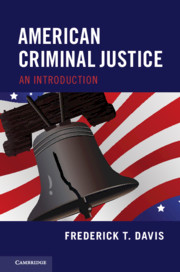Book contents
- American Criminal Justice
- American Criminal Justice
- Copyright page
- Dedication
- Contents
- Acknowledgments
- 1 Introduction
- 2 The Federal Structure; Sources of the Law
- 3 Investigation and Evidence-Gathering—The Participants
- 4 Investigation and Evidence-Gathering—Procedures
- 5 Arrest and Pretrial Detention
- 6 The Decision to Prosecute, or Not
- 7 Joinder of Charges and Defendants
- 8 Venue
- 9 Assistance of Counsel
- 10 Trial Rights and Preparation for Trial
- 11 Alternative Outcomes
- 12 Double Jeopardy
- 13 The Trial
- 14 Sentencing
- 15 Appeals
- 16 Corporate Criminal Responsibility
- 17 Internal Corporate Investigations
- 18 Professional Responsibility
- 19 Conclusion
- Bibliography
- Index
18 - Professional Responsibility
Published online by Cambridge University Press: 08 June 2019
- American Criminal Justice
- American Criminal Justice
- Copyright page
- Dedication
- Contents
- Acknowledgments
- 1 Introduction
- 2 The Federal Structure; Sources of the Law
- 3 Investigation and Evidence-Gathering—The Participants
- 4 Investigation and Evidence-Gathering—Procedures
- 5 Arrest and Pretrial Detention
- 6 The Decision to Prosecute, or Not
- 7 Joinder of Charges and Defendants
- 8 Venue
- 9 Assistance of Counsel
- 10 Trial Rights and Preparation for Trial
- 11 Alternative Outcomes
- 12 Double Jeopardy
- 13 The Trial
- 14 Sentencing
- 15 Appeals
- 16 Corporate Criminal Responsibility
- 17 Internal Corporate Investigations
- 18 Professional Responsibility
- 19 Conclusion
- Bibliography
- Index
Summary
During pretrial phases of a criminal matter, during trial, and on appeals, many of the principal participants—the prosecutors, defense counsel, and judges—all share a common profession: they are “lawyers” (or “attorneys,” which is the same thing). The legal profession also includes in-house counsel for corporations if they are trained as lawyers and exercise legal functions within their corporate employers. Irrespective of their position or title, all such professionals must be licensed to practice law, and have a duty to act professionally and to respect certain ethical standards. Judges, prosecutors, and corporate counsel do not receive legal education or training that is different from those of other attorneys, and in fact lawyers shift from one role to another more frequently than is the case in many other countries.
As a practical matter, this means that during an adversarial criminal proceeding, the adversaries (prosecutors and defense counsel) and judges often may know each other, either from common education at the same or similar schools, or from acquaintanceship during the current or previous employment.
- Type
- Chapter
- Information
- American Criminal JusticeAn Introduction, pp. 133 - 141Publisher: Cambridge University PressPrint publication year: 2019



